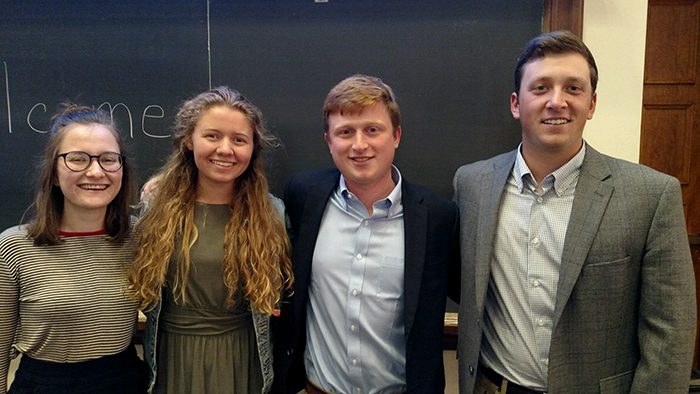Ready to Take on the World

From left: Jackie Goodwin, Emily Whitaker, Max Singer and Jake Band, all of the class of 2017. Photo courtesy of Helen Takacs.
First social innovation & entrepreneurship cohort presents capstone research
by MaryAlice Bitts-Jackson
It's been two years since the social innovation & entrepreneurship (SINE) certificate program launched at Dickinson, and the first students to sign up are now ready to take on the world as new grads. Last week, class of 2017 movers and shakers Jake Band, (psychology), Jackie Goodwin (environmental studies), Max Singer (economics) and Emily Whitaker (physics) presented their capstone research to community leaders, and after their presentation they weighed in on SINE’s inaugural years.
A communal effort
The SINE program provides a framework to develop fresh approaches to social and environmental issues. For their joint senior project, the students studied the feasibility of colocation, or resource- and space-sharing, for human services organizations in Carlisle.
After reviewing scholarly literature on colocation and studying best practices, the students researched the local community's unique features and needs. Then it was time to develop interview questions and protocols—new research territory for three of the four—and go out into the community to gather data from service providers, stakeholders and clients about the challenges they face and their attitudes toward a proposed nonprofit park.
The cohort met weekly to compile and analyze the data, and last week they presented their findings and recommendations in Denny Hall. More than a dozen local nonprofit leaders attended.
"There are many things going well in the local community," Band said, "and we recommend that [local nonprofit organizations] expand and develop their programs by tapping others’ resources and expertise" through colocation, using a pilot program launched by a local church as a guide. In addition to saving on rent and salaries for shared support staff, colocation would afford greater opportunities for collaboration on grants and other joint projects, the students said, and a nonprofit park would help clients without reliable transportation, particularly those who must visit more than one office in the same day. A shared third-party coordinator would help ensure fair allocation of resources and would offer each organization a fresh point of view.
Reflections and plans
Speaking after the presentation, the students looked back on their experiences as Dickinson's first SINE cohort and said they were excited to apply what they've been learning. Singer enjoyed looking under the hood of the colocation business model after serving a summer internship at a colocating nonprofit in Washington, D.C. Goodwin, who held a social-entrepreneurial internship at Ashoka and also took a SINE course while studying abroad in Copenhagen, appreciated the chance to explore new ways to grapple with problems she learned about in her environmental studies classes.
"I took a lot of electives and other classes I might not have taken otherwise as a psychology major, and they've given me a new perspective on what it means to take action," added Band, who tapped his SINE coursework and skills to secure an internship at the Cal Ripken Foundation.
“I’ve always been interested in answering big questions, and this program gave me new ways to consider them,” agreed Whitaker, explaining that her SINE classes, combined with her physics coursework, added up to “a more holistic" educational experience. "I absolutely loved it. It’s really been able to shape and expand how I think.”
Links
- Social Innovation & Entrepreneurship
- “Social Entrepreneurship Success”
- “Optimistic Innovation” (Emily Whitaker ’17)
- Innovation & Entrepreneurship at Dickinson
- Civic Engagement at Dickinson
- Latest News
Published May 12, 2017